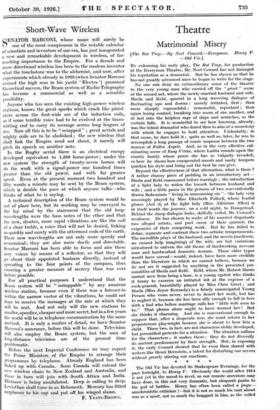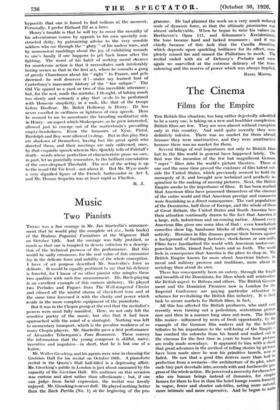The Old Vic has devoted its Shakespeare Evenings, for the
past fortnight, to Henry V. Obviously the world after .1914 is not yet in the mood to revel, as our remote ancestors may have done, in this not -very dramatic, but eloquent psalm to the god of battles. Henry has often been called a jingo— anachronistic criticism !—but it is not so much his rant about war as a snort. not so much the braggart in him, as the veiled
hypocrite that one is forced to find tedious at the moment. Personally, I prefer Richard HI as a hero. Henry's trouble is that he will try to cover the rascality of his adventurous course by appeals to his own specially con- structed deity, by patronizing advice to the very sensible soldiers who see through the " glory " of his useless wars, and by nonsensical ramblings about the joy of exhibiting wounds to one's family if one happens to get back home after the fighting. The worst of his habit of seeking moral accuses for murderous action is that it necessitates such intolerably boring scenes as that in the first act, where he consults a gang of greedy Churchmen about his " right " to France, and gets drowned—he well deserves it !—under my learned lord of Canterbury's inaccurate history of the " law salique." The Old Vic spared us a yard or two of this incredible utterance ; but, for the rest, made the mistake, I thought, of taking much too slowly and seriously a play that needs to be performed with Homeric simplicity, in a rush, like that of the troops before Harfleur. Mr. Baliol Holloway is Henry. He has never excelled in swiftness or lightness of easy speech. Here he seemed to me to accentuate the brooding meditative side in Henry—an aspect which Shakespeare, as he grew interested, allowed just to emerge out of the scatterbrain's prevailing empty-headedness. Even the humours of Nym, Pistol, Bardolph and Boy were allowed to drag. But in this play they are shadows of themselves, having lost the great spirit who directed them, and their meetings are only enlivened, once, by that exquisite speech wherein Mrs. Quickly tells of Falstaff s death—words whose perfection of characteristic prose we owe, in part, let us gratefully remember, to the brilliant emendation of the once-despised Theobald. The rest of the acting is up to the usual Old Vic level—not above it. But Mr. Wyse made a very dignified figure of the French Ambassador in Act I, and Mr. Horace Seipreira was at least rapid as Flucllen.
R. J.



























































 Previous page
Previous page